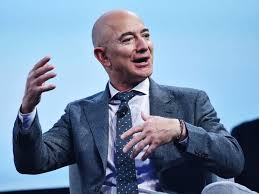Jeff Bezos has a formulation about one-way doors and two-way doors—decisions that are irreversible and permanent and those that can always be unwound. Stepping through what’s almost certainly a one-way door on Tuesday, Bezos said he will resign as chief executive officer of Amazon.com Inc. and become executive chairman later this year.

He will hand day-to-day control to Andy Jassy, his longtime head of Amazon Web Services, a swiftly growing division that has almost singlehandedly changed the way companies buy the technology that powers their businesses.
With that comes at least a partial end to one of the most epic runs in modern business history. Yet, Bezos’s move feels, in many ways, natural and even inevitable. Over the last 25 years, the Amazon founder led the company through perhaps the most fertile period of any American business ever.
Amazon was first just an idea at the Wall Street hedge fund D. E. Shaw & Co., where Bezos was a vice president; then it was an online bookseller and high-flying dot-com stock during the late 1990s. Bezos then rescued the company from the internet bust by formulating and guiding new inventions like the Kindle, Amazon Prime and AWS. Over the last decade, he has piloted Amazon to a $1.7 trillion market capitalization, where it currently occupies the same rarified trillion-dollar air as Microsoft Corp. and Apple Inc.
But Bezos’s decision to step down also reflects an uncomfortable reality for one of the wealthiest people in the world: The walls of his highly compartmentalized empire have been crumbling for some time. It’s becoming increasingly difficult to be Jeff Bezos (at least by Bezos’s standards).
He presides over a collection of properties that spans not only Amazon but The Washington Post, several philanthropies and a space company, Blue Origin LLC, that lags far behind its chief rival, Elon Musk’s Space Exploration Technologies Corp.
Just consider the ways Bezos’s various assets have collided over the past few years. His ownership of The Washington Post consistently angered the last U.S. president and arguably cost Amazon the Pentagon’s $10 billion JEDI cloud computing contract, which the Donald Trump-controlled Defense Department awarded to Microsoft. When he visited India in early 2020, Prime Minister Narendra Modi declined to meet with him, and a senior official criticized the Post’s coverage of the country.
When Bezos and his partner, Lauren Sanchez, started canvassing climate philanthropies last year to begin making the first of $10 billion in grants from the Bezos Earth Fund, at least some of the organizations were skeptical of Amazon’s relationship with its front-line workers and hesitant to accept Bezos’s largesse.
Many of the criticisms levied against Bezos and his empire are reasonable and can be addressed. But the most constrained resource in Bezos’s web of conflicting business holdings is his own time, and that can’t be easily reconciled. He used to spend part of Wednesdays and weekends at Blue Origin, his Kent, Washington-based space company.
But that may no longer be enough. Blue Origin is two years older than SpaceX but so far has little to show for it, despite the fact that Bezos funds the company by selling $1 billion of his Amazon stock every year. In January, Blue Origin launched a successful test flight of New Shepard, a rocket that will carry paying tourists to the edge of suborbital space. It hopes to send actual people on a mission this summer, according to a person with knowledge of the company’s plans who asked not to be identified.
The Blue Origin website proclaims, “We are not in a race, and there will be many players in this human endeavor to go to space.”
But, practically everyone in the space industry, including those at SpaceX and even at Blue Origin, recognizes that Musk is flying literal circles around Bezos. SpaceX regularly flies into orbit and to the International Space Station and just announced plans to take paying civilians into orbit. In his email to Amazon employees on Tuesday, Bezos said stepping down will give him more time to focus on “other passions,” including Blue Origin. “I’ve never had more energy, and this isn’t about retiring,” Bezos wrote.
Source: Bloomberg















